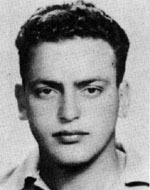Epstein, Avner
Son of-Ze’ev and Yaffa. He was born on 12 June 1944 in Jerusalem. His parents came from Poland and to the memory of his grandfathers who perished in the Holocaust. They called him Avner, and they meant: a candle for the fathers. He spent his early years in the Nahlaot neighborhood in the city, and when he reached school he attended the Beit Hayeled elementary school. After graduating from high school in Beit Hakerem, he received his high school diploma in the Department of Orientalism. Avner was a member and active instructor of the United Movement in the Jerusalem Center branch. He was particularly fond of sports and was a member of Hapoel. He was also interested in public work, as he proved in his activities at the university’s student union. After graduating from high school, he was drafted into the IDF, in October 1962, when he was a member of the “Yagev” group and joined the IDF in the framework of his nucleus and during the Seder period he was at Kibbutz Afikim. In April 1966, Avner completed a course for company commanders, and at the rank of lieutenant, he was discharged from the army on the eve of his release. From the Independence Day parade, told his mother that he felt that he had completed an important stage in life and was at the threshold of a new era Avner went on a trip abroad and showed himself to be able to earn the full amount of money that he had planned for the trip he had planned, which had a profound impact on him, especially during his visit to relatives in Poland. “I traveled as an Israeli,” Avner said when he returned from the trip, “and returned as a Jew.” In addition to his experiences and the experiences he experienced, this journey, which lasted six months throughout Europe, opened wide horizons – to know and to know. On his return, his family discovered another characteristic: the family sense was evident in him, for he felt himself as a link in the chain of generations. Following the Mizrahi trend in high school, he began studying at the Hebrew University of Jerusalem in history and the Middle East. It was an intensive and busy period in his life, and apart from the studies in which he was active, he was active in the student union as a member of its council. Avner was also employed at the Israeli Science Translation Center in Jerusalem. In the Six Day War, Avner was in the Jerusalem Brigade and participated in battles in southern Jerusalem; He was stationed in the garrison in Hebron and was responsible for the area of the Tomb of the Patriarchs. Once his mother met him in Hebron as part of a trip organized for the wives of soldiers, and Avner also took her for a walk. She found him standing next to the Cave of the Patriarchs, “Uzi” in his hand. The mother looked at him with a puzzled look, but he replied with a shrug: “Well, children are children.” More than once he said to her: “I do not hate anyone – and I do not hate anyone.” The Arabs had no hatred for him – and he would be shocked to see the refugees crossing the Jordan to the east. His parents, loved and respected by him and whom he thought of as loyal allies for advice and resourcefulness, saw their son as a complete and perfect man, all exalted and exultant, and once a joke accompanied by a worn-out daughter. They saw him climb up the ladder of life so quickly that it was hard to stop him-and his day was packed with work, study, and innovation. Avner knew how to love with all his Lev because he would listen to the other’s Lev. As a native of Jerusalem, he would raise his capitalHe was Simcha and loved with all his soul. Toward the end of the second school year, Avner went on a week of training officers. On the 28th of June 1968, Avner left the Golan Heights, together with four of his fellow officers, for a night journey in order to reach Jerusalem as soon as possible. The rest of the passengers were brought to eternal rest in the military cemetery on Mount Herzl in Jerusalem, and on the first anniversary of his death, his parents and his friends published a book in his memory with the participation of the staff of a translation company.
